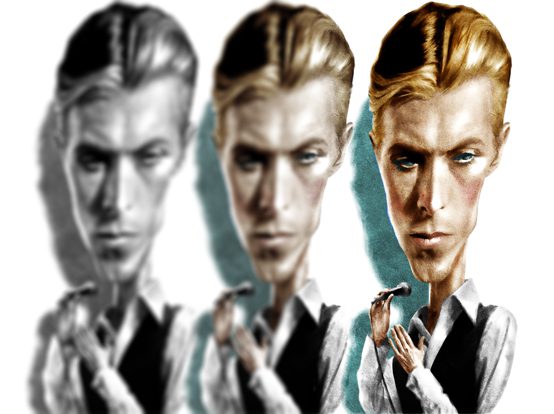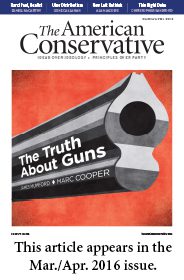Thin Right Duke

People, told that I don’t care for most songs written after 1975, ask me condescendingly whether I like music. I do. But to my ear, a watershed occurred around that time: the coming of the rock star who took himself very, very seriously. As a rule, such individuals disdained the view that pop’s primary function has always been to supply an emotional pick-me-up for a weary public, and they instead offered us a relentless diet of screwed-up nihilism and phony salves. There are honorable exceptions, of course, and I acknowledge the sense of community that can come from being packed into a Lady Gaga or Macklemore concert in order to move to a rhythm at the same time as everyone else. As hordes of North Korean military recruits stage parades, lifting posters of the Dear Leader and lowering them simultaneously, so people clap along and wave lighters during these performances.
All of which is to ask the question: how best should we remember David Bowie, who died on January 10 at the age of 69? Is it for his expansive social conscience, restless creativity, exquisite taste, and philanthropy—what one obituary refers to as his “monumental fame as a communicator of radical political theory [and] his post-punk instinct to subvert the status quo”? Or is it for the dozen or so memorable songs he wrote in the early 1970s, tunes that offer lyrics of almost masterly vacuity and rely instead on crashing blues-guitar chords, infectious choruses, and a large degree of nostalgic goodwill? As Carlyle reminds us, all heroes will be flawed. Bowie undoubtedly had his humanizing contradictions, and, equally as clear, he operated at a level 20 IQ points above that of the standard-issue rock star. But “monumental fame as a communicator of radical” politics? Let us examine the facts.
Bowie’s early albums were generally a mix of unthreatening acoustic pop and dappled English pastoralia. They featured songs with titles like “Memory of a Free Festival,” and their mission was to update the simple folk music of the 1950s. The great leap forward came in 1971, when Bowie hired a proper band and began to examine some of the darker elements of the post-Woodstock culture. On albums like Hunky Dory and Ziggy Stardust, Mick Ronson’s quicksilver guitar dripped magic dust over lightly jazzy piano, arrestingly inexact harmonies, and the occasional striking lyric. Bowie’s reference to “Homo Superior” in the song “Oh! You Pretty Things” suggested at least passing familiarity with the concept of Nietzsche’s superman. “Quicksand,” for its part, seemed to start off as a satire on fascism and then end up as a grim elegy for the human race. By the time Aladdin Sane came around in 1973, the old greeting-card pleas for world peace had been replaced by a song-cycle infused with disillusionment and anticlimax about both success and life on the road, offering a thoroughly dystopian view about the prospects for mankind as a whole.
A year or two later, having put out an album called Diamond Dogs—either “an entirely fresh and thrilling adaptation of Orwell’s 1984” or “37 minutes of nihilism, decadence, and decay,” depending on which review you read—Bowie, somehow logically, moved to Berlin. This was where things got genuinely strange. If in his Ziggy incarnation Bowie had represented the liberating, free-form aspects of rock—an agent of reform—just three years later he had this to say on Britain’s latest cyclical economic crisis: “I believe very strongly in Fascism. The only way we can end the sort of decay that’s hanging foul in the air at the moment is to speed up the progress of a right-wing, totally dictatorial tyranny and get it over as fast as possible. People have always responded with greater efficiency under a regimental leadership.”
The fascination with supermen and the master race had occasionally surfaced in Bowie’s early lyrics and interviews. By 1976, now under the strain of cocaine addiction, he began preaching from the text of Aryan supremacy. Yes, Bowie was stoned out of his head for much of this time. But no, it wasn’t “all just a bit of innocent fun,” as he later claimed. There was the moment, for instance, in April 1976 when Bowie elected to snap out a Nazi salute while standing at the site of Hitler’s wartime bunker. He at least made the photographer who recorded the scene promise never to release the picture, thus showing marginally better sense than when he told a nearby reporter: “Adolf Hitler was the first superstar.” A month later, Bowie greeted an adoring crowd at Victoria Station in London by rising to his feet in the back of an open-topped black Mercedes, clicking his heels, and thrusting out his right arm, something you’re unlikely to do by mistake. Bowie’s agent later explained that the gesture had in fact been a “peace sign,” which as a crisis-management exercise is roughly on a par with Rose Mary Woods’s gymnastic feat in demonstrating her innocent erasure of Watergate tapes.
Later in the 1970s, Bowie’s apparent desire to become the Oswald Mosley of his day was exchanged for a fierce espousal of art and an equally fierce rejection of any lingering post-hippyish sensibilities about money. He raked it in. After Berlin, Bowie settled for several years in a well-appointed villa above Blonay in Switzerland. When he cut a record, his band members flew in to join him from places like Detroit and London and were put up in hotels among the lush vineyards, steeply angled roofs, and dove-blue sea haze of the local village, which became an unlikely rock-music commune as a result. Bowie never forgot how he was treated in Switzerland, where he could stroll around the nearby lake with his wife and young son and no one ever hassled them. The tax break didn’t hurt, either.
As we’ve been reminded in his obituaries, Bowie was rarely afraid to try something new. His fashion metamorphoses and stage personae provided a constantly moving target from 1969’s “Space Oddity” onwards. It’s perhaps worth noting that this restless spirit of innovation wasn’t restricted to the musical side of his career. In 1997, Bowie became the first major artist to turn himself into a share issue, payable over 10 years at 7.9 percent. The essence of the deal was that investors would each take a stake in an average two million album sales annually, as well as the revenue from 250 songs turned into sheet music, commercials, and background for elevators, supermarkets, and voice mail, while the man responsible for it all pocketed $55 million in cash. Yet again, Bowie had left his rivals at the gate.
Some discrepancy exists, then, between the popular view of Bowie’s key message—constant artistic reinvention, irrespective of any commercial rewards—and the reality, with its litany of high-powered lawyers and accountants, injunctions against would-be biographers, and, of course, those “creative differences” habitually trotted out to mask the true air of mutual loathing surrounding many a pop group. Nothing unusual about that, perhaps, but as with others of his ilk—Mick Jagger comes to mind—there was something about Bowie that remained curiously English and banal. He wanted, for example, “a better education for all kids.” Despite having released an album, 1995’s Outside, loosely based on the murder and dismemberment of a teenaged girl, he was “sick about violence.” Adolescents he pitied because they seemed not to enjoy themselves: “They go through a grimly day-to-day existence. There doesn’t seem to be the bounce that I remember when I was the same age.”
The role in which Bowie fancied himself was that of the moralist, and the real need in modern life, he once confided, was “the fight for good against evil.” In practical terms this seems to have meant a mild fondness for the big-tent politics of Bill Clinton and Tony Blair and a flagrantly unfashionable belief in sound traditional values such as those he called “self-denial, discipline and constant graft,” along with a refreshing ability to get through lengthy autobiographical interviews without whining, blaming, or emoting. (No one outside his family knew of his final illness.)
 In a book that appeared in 1996, Bowie was outed as the sort of bygone English gentleman who likes madrigals, sheepdogs, and even attending the local Anglican church. Most journalists sounded as amazed by this last fact as if they were reporting on the Archbishop of Canterbury conducting a pagan fertility rite—perhaps not as remote a prospect as it once was. During the second half of his life, Bowie remained a solidly earthbound character. If you were to pigeonhole him, always a dangerous exercise in his case, it might be as a pragmatic liberal who didn’t join groups and tended to think people should help themselves rather than rely on the hand of the state. To read some of the more excitable recent claims about Bowie and his alleged radicalism in all matters social and artistic is only to note how far we have moved beyond due respect for a long-running entertainer.
In a book that appeared in 1996, Bowie was outed as the sort of bygone English gentleman who likes madrigals, sheepdogs, and even attending the local Anglican church. Most journalists sounded as amazed by this last fact as if they were reporting on the Archbishop of Canterbury conducting a pagan fertility rite—perhaps not as remote a prospect as it once was. During the second half of his life, Bowie remained a solidly earthbound character. If you were to pigeonhole him, always a dangerous exercise in his case, it might be as a pragmatic liberal who didn’t join groups and tended to think people should help themselves rather than rely on the hand of the state. To read some of the more excitable recent claims about Bowie and his alleged radicalism in all matters social and artistic is only to note how far we have moved beyond due respect for a long-running entertainer.
I’ll end with my favorite David Bowie story, one that illustrates the deep vein of moral conservatism that lay just beneath the kooky exterior. On Christmas Eve 1986, a friend of mine named Nick Miles happened to attend a carol service at the Anglican church on the private island of Mustique in the Grenadines. “There were 40 or 50 people there, nearly half the island,” he told me. “At the very last minute, as the door was closing, Bowie and Mick Jagger walked in together. They were both wearing orthodox jackets and ties and they stood there side by side, singing away on all the hymns, and generally behaving like a couple of middle-aged schoolteachers. Other than the fact that it happened to be 90 degrees outside, we could have been in some draughty parish church in England.”
An hour later, Bowie and Jagger both stood patiently in the queue that filed past the vicar who had conducted the service, awaiting their turn to say goodbye. My friend happened to be next to them in line and heard the exchange that followed. Jagger was “joking about, doing funny accents, as if deflecting his sudden embarrassment at being seen in church.”
Bowie, for his part, nodded respectfully to the vicar, shook his hand, and said: “Whenever I hear the nativity story, tears of joy fill my eyes.” I’m assured that he sounded completely sincere.
Christopher Sandford is the author of Bowie: Loving the Alien.
Comments